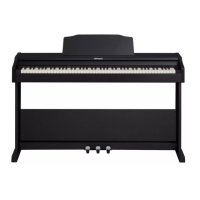4
Making Settings on the RP102
You can control a variety of functions by holding down the [Function] button and pressing a key.
Selecting Tones
1
Press one key to play one sound at a time.
Press two keys simultaneously to play two sounds as a layer. This feature is called “Dual Play.”
Selecting an Internal
Song
2
Selects a category.
3
Selects a song.
&
“Internal Song List” (p. 13)
Playing/Stopping an
Internal Song
4
Play all songs in the selected category, or play just one song.
Press the same key again to stop playback.
Changing the Volume of
the Song
5
0–10 (default: 10)
While the Song Plays,
Specifying the Keyboard
Sound (SMF Play Mode)
6
Normally you’ll use “AUTO SELECT.”
Setting Explanation
AUTO SELECT
(default)
Automatically switches the SMF Play Mode to either “INTERNAL” or “EXTERNAL”
depending on the song that is being played.
INTERNAL
The sound of the song that’s playing and the sound on which you’re performing will be
the same. If you switch sounds on the RP102, the sound of the song also changes.
This setting is recommended when you’re playing the internal songs.
A damper resonance (*) eect is applied to the piano sound of the song.
EXTERNAL
The sound of the song that’s playing can be specied independently of the sound that
you’re playing on the keyboard. Even if you switch sounds on the RP102, the sound of
the song won’t change.
This setting is recommended when you’re playing a song le from a USB-connected
computer.
The damper resonance (*) eect is not applied to the piano sound of the song.
* This is the resonance of the overall piano (the sympathetic vibration of strings other than those that were
actually played, and the sympathetic vibration of the entire instrument) that is heard when you hold down
the damper pedal of an acoustic piano.
Starting/Stopping the
Metronome
7
The metronome turns on (starts) or o (stops) each time you press this key.
Changing the
Metronome Volume
8
O, 1–10 (default:5)
Changing the Beat
9
0/4 (*), 2/2, 3/2, 2/4, 3/4, 4/4, 5/4, 6/4, 7/4, 3/8, 6/8, 8/8, 9/8, 12/8 (default: 4/4)
* When the metronome is sounded, all beats are heard with the same sound.
Changing the Tempo
10
10–500 (default: Song Tempo)
Adding Reverberation to
the Sound (Ambience)
11
The reverberation that is characteristic of a performance in a concert hall can be added to the sound.
0–10 (default: 2)
Adjusting the Brightness
of the Sound (Brilliance)
12
You can adjust the brightness of the sound when you play the keyboard or when you play back a song.
-10–10 (default: 0)
5
-1
ON/OFF
D1 D2 D3E1 E2 E3F1 F2 F3G1 G2 G3A1 A2 A3B1 B2 B3C2 C3 C4
D4
+1
Concert Piano
Bright Piano
Harpsichord
Pipe Organ
Epic Strings
Ballad Piano
Tremolo EP
Celesta
Combo Jz.Org
Soft Pad
Mellow Piano
Pop EP
Vibraphone
SymphonicStr1
Jazz Scat
Listening
Czerny 100
Masterpieces
Hanon
Scale
AUTO SELECT
-1
+1
10
INTERNAL
EXTERNAL
Easy Piano
Play/stop one song
Play/stop all song
Previous song
Next song
First song
Hold down
1
2
1 2 3456 78
A0 B0 C1
F#3F#2F#1
C#3C#2C#1A#0 D#3D#2D#1 A#3A#2A#1 G#3G#2G#1

